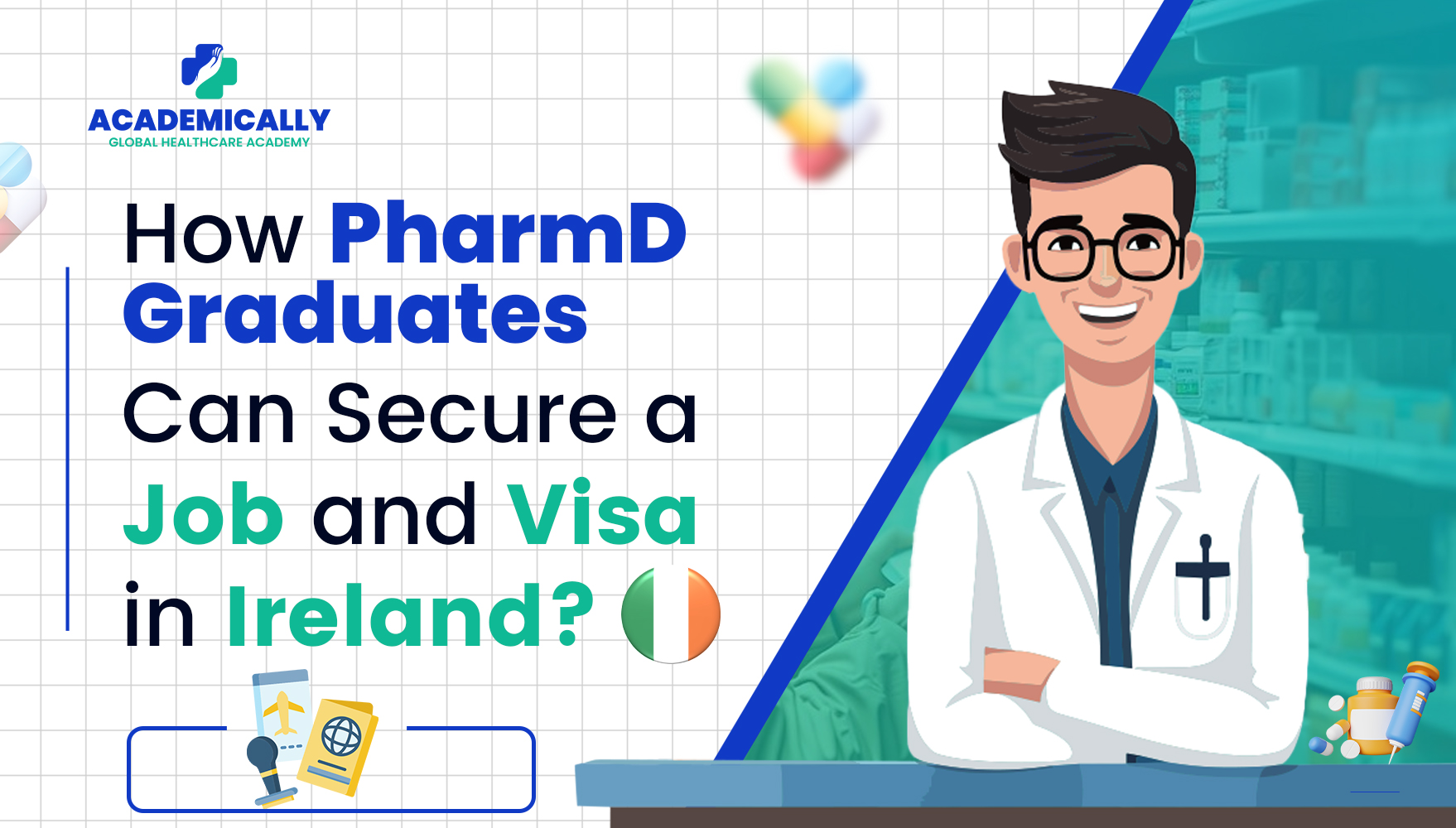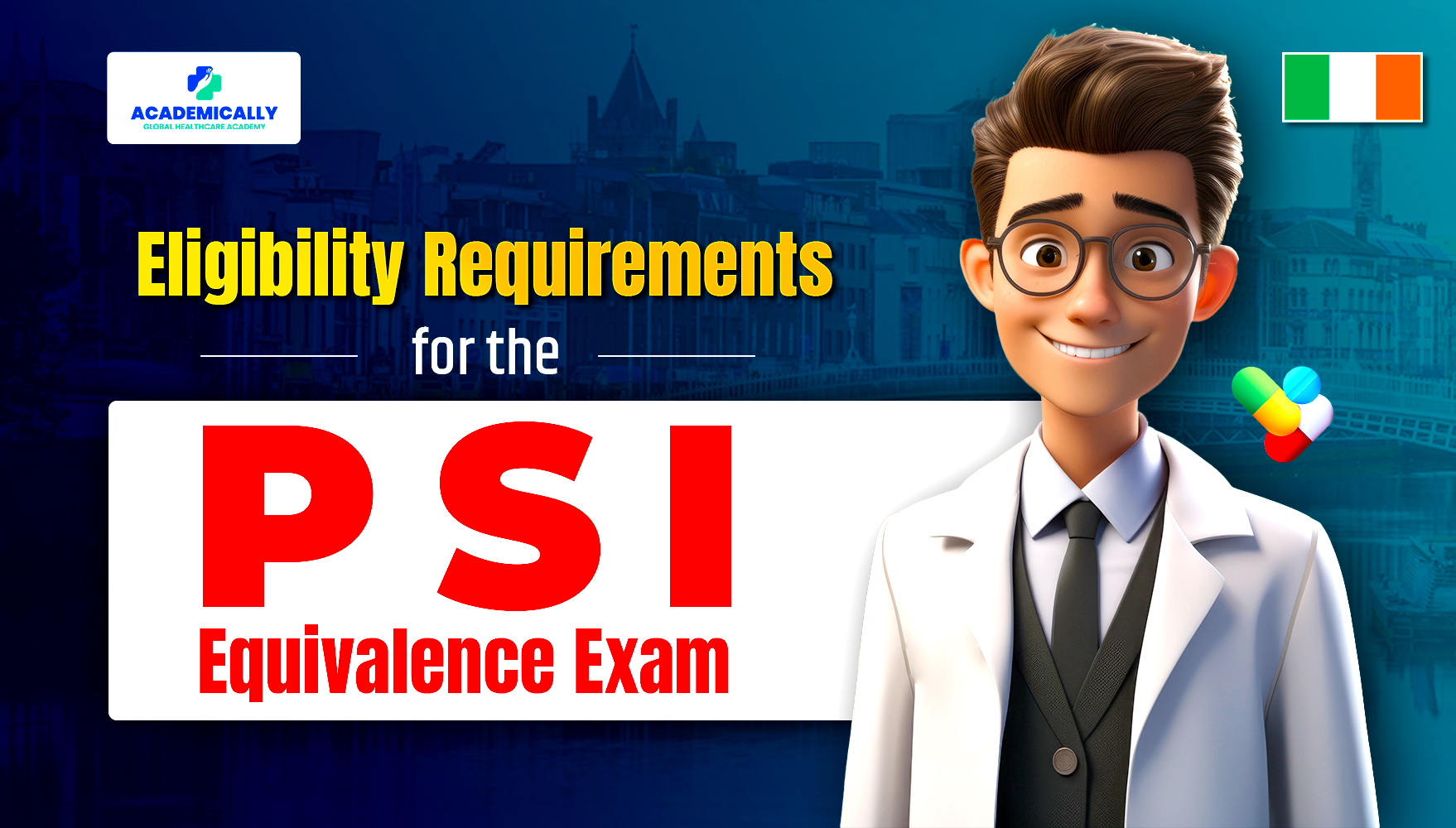Steps To Get Registered In Ireland As A Pharmacist
Third-country qualification recognition (TCQR)
Non-EU pharmacists must undergo the TCQR process (Third Country Qualification Recognition), which consists of four steps, as discussed below.
Learn about the PSI Equivalence Exam eligibility requirements here.
1. Application for verification
The first step of the TCQR process is Document verification. Submit all necessary documents to PSI, including your transcripts, degree certificates, and proof of professional experience. The PSI will verify the authenticity and equivalence of your qualifications. After the verification, PSI will give the Equivalence Exam dates for the candidate's undertaking. The TCQR application fee is Euro 1500/-
2. PSI Equivalence Exam
The PSI Equivalence Exam consists of MCQ and OSCE. It is conducted remotely in a proctored setting. The exam has a 2-day schedule. On day 1, MCQ and written OSCE are conducted. On day 2, Verbal OSCEs are conducted.
Multiple Choice Questions (MCQ):
This exam assesses your theoretical knowledge of pharmacy. It consists of 80 questions and lasts 2.5 hours, with an additional 15 minutes for reading.
Objective Structured Clinical Examination (OSCE):
This evaluates your practical skills and clinical competency. The OSCE consists of two parts:
- Day 1: Written Assessment
- Duration: 40 minutes
- Components: 2 written OSCE stations, each lasting 20 minutes
- Day 2: Verbal Assessment
- Duration: 60 minutes
- Components: 6 OSCE stations, each lasting 7 minutes (1 minute to read the question and 6 minutes to answer)
3. Adaptation (Internship)
P.S. High performance in the PSI exams can lead to exemption from the adaptation period.
4. Professional Registration Examination (PRE Exam)
The PRE Exam is the final step, demonstrating your readiness to practice independently as a pharmacist in Ireland. Passing this exam officially qualifies you to join the Irish workforce as a pharmacist.
5. English Proficiency Test
For registration as a pharmacist in Ireland, the candidate should clear the English Proficiency test, such as IELTS, TOEFL, or OET. The requirement for IELTS is 7 bands each except for writing (6.5 bands).
About Pharmacy Courses in Ireland
Obtaining a work visa directly can be challenging. However, you can enhance your prospects by enrolling in short courses lasting 1 or 2 years on a student visa. After completing your course, you'll be better positioned to secure employment in Ireland through a post-study work visa.
Choose the best course from the Top 10 Healthcare Courses In Ireland After Pharmacy Degree.
Student Visa for International Students
International students must obtain a student visa to study in Ireland. Various types of student visas are available, each with specific requirements. Understanding the visa application process and the necessary documents is crucial for a smooth transition to studying in Ireland.
Types of Student Visas
Short Stay Study Visa: Ideal for students planning to study in Ireland for up to 90 days, this visa is typically for short-term language courses or non-degree programs.
Long-Stay Study Visa: This visa is required for students pursuing a full-time course in Ireland, lasting more than 90 days. It is suitable for undergraduate, postgraduate, or doctoral programs.
Post-Study Work Options
After completing their studies, international students in Ireland can explore several post-study work options to gain valuable professional experience. These options include the Irish Third Level Graduate Scheme and the Stay Back Option.
Irish Third-Level Graduate Scheme
- Purpose: Allows graduates to stay in Ireland for up to 2 years to seek employment or start a business.
- Eligibility: Graduates from recognised Irish higher education institutions.
- Benefits: Work in any role or sector, gain experience, and enhance skills.
Stay Back Option
- Purpose: Enables international students to remain in Ireland for up to 24 months post-graduation for employment or business opportunities.
- Eligibility: Holders of bachelor’s, master’s, or doctoral degrees from Irish higher education institutions.
- Benefits: Explore job opportunities, build a professional network, and apply knowledge and skills in the Irish workforce.
Engaging in post-study work in Ireland offers numerous benefits. It allows students to put their education into practice, gain hands-on experience, and develop professional networks. Additionally, working in Ireland provides exposure to a vibrant and dynamic business environment, opening doors to potential long-term career opportunities and growth.
Critical Skills Employment Permit
The Critical Skills Employment Permit is designed to attract highly skilled professionals to the Irish workforce, addressing labour shortages in key sectors, including healthcare.
This permit targets professions essential to the growth of Ireland’s economy and is in high demand but in short supply within the country.
Pharmacists often qualify for this permit due to their specialised knowledge and the high demand for them in the healthcare sector.
One of the major benefits of this permit is the expedited path to family reunification and long-term residency for permit holders. The job offer must be for a minimum of two years. After completing these two years, individuals can apply for a Stamp 4 visa, which allows them to work in Ireland without needing a permit.
Job Opportunities in Ireland for Pharmacists
Ireland offers many employment opportunities for international students during and after their studies.
Ireland is also a global hub for the pharmaceutical industry. Many of the world’s top pharmaceutical companies, including Pfizer, Johnson & Johnson, Roche, and Novartis, have significant operations in the country. This presence creates a high demand for skilled pharmacists.
Final Thoughts
Ireland offers a fantastic opportunity for PharmD graduates to advance their careers. You can seamlessly join the Irish workforce by recognising your qualifications with the Pharmaceutical Society of Ireland, passing the required exams, and completing an internship. Enrolling in short courses on a student visa can further boost your job prospects with robust post-study work options and a thriving job market.
If you need further assistance about becoming a pharmacist in Ireland, fill out this form for one-on-one counselling.






